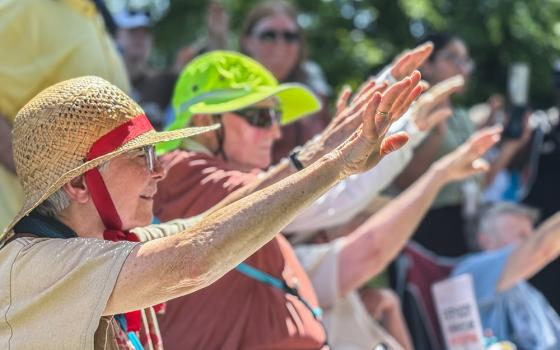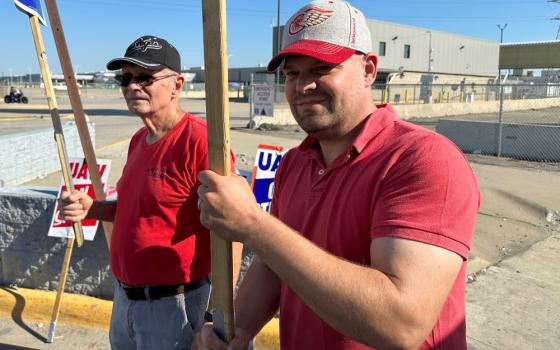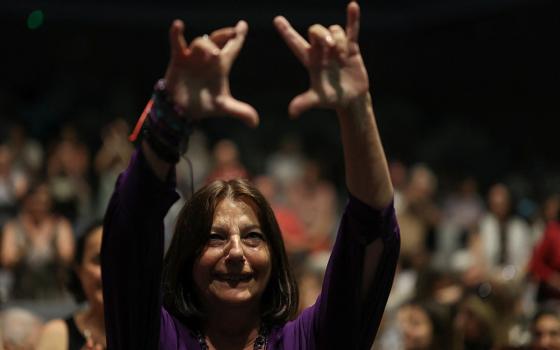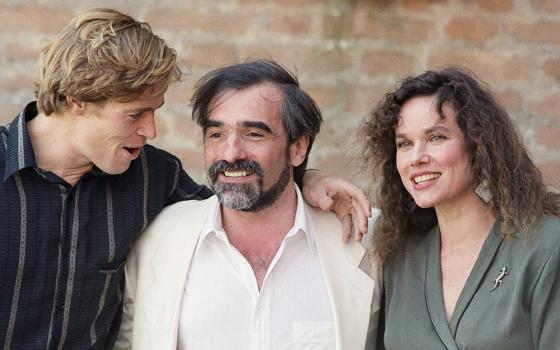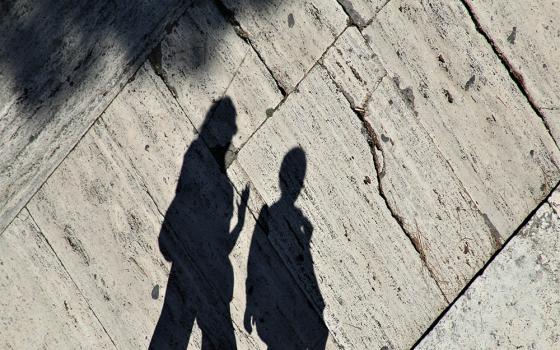
Gastronomy students with the food they prepared for a party the Dolores Sopeña Center hosted. (Provided photo)
Ever-evolving with the needs of the times, the sister-run Dolores Sopeña Center in Puente Alto, Chile, has graduated tens of thousands of men and women, migrants and locals, professionals and people with no education pursuing their entrepreneurial dreams.
"Our participants are those who have not had opportunities to study, and our mission is to open doors for them so that they can improve their lives and, usually, pay it forward to others," said Sr. Gabriela Herrera, a sister of the Dolores Sopeña Catechist Institute and director of the center.
"But a couple years ago, we realized people were signing up who were already quite educated — either they had finished high school or had studied in universities but had not found work in their field. They had become part of the educated poor, having degrees but no work."
At the Dolores Sopeña Center, located just outside the capital city, they could have a second chance by becoming entrepreneurs. Graduates have gone on to open high-end hair salons and local bakeries, or to teach language classes.
The center's workshops and classes either train individuals in a particular trade or, for those who already have a mastered skill, teach them how to turn it into a business or improve their existing shop.
"Oftentimes, we're surprised by what they accomplish with what they've learned," Herrera said.
Sr. Patricia Hermosilla, also a sister of the Dolores Sopeña Catechist Institute, said that to her surprise, teachers and engineers increasingly have been in need of work and are signing up for classes at the center. She recalled one particular engineer who learned how to make curtains at the Sopeña Center, which is how he makes a living now.

Srs. Gabriela Herrera and Paty Hermosilla of the Dolores Sopeña Catechist Institute (GSR photo/Soli Salgado)
To the Chilean government, one's salary determines a certain classification for services; the more economically disadvantaged, the more they qualify to receive. But it's common for many to be in limbo, barely surpassing the rank that would afford them necessary social services (such as housing assistance or free schooling) but still not making enough to support themselves.
"Left on the edge, they're left wondering, what do I do?" Hermosilla said. "So they come here, where you aren't judged by your classification or salary. ... Still, the vast majority come from the most disadvantaged communities."
Typically, those who attend the center are between the ages of 23 and 65, with a few exceptions, such as elderly women who provide for their grandchildren. In addition to the sisters and volunteer teachers, the staff includes a psychologist and a social worker.
A point of pride for the sisters and volunteers is the sameness with which everyone is treated, a detail not lost on those who come to the center. (Classes were not in session at the time of reporting, so Global Sisters Report could not interview students.)
"Dolores Sopeña always said that there was no difference between a person who lives in the mud of the world and the blood of Christ," Hermosilla said.
Herrera recalled one young woman who attended class while on probation, wearing an ankle monitor and likely spending nights in a jail cell.
"She said it caught her attention that the entire time she came to the center, nobody ever questioned or judged her. When she came back the day after she was cleared in her hearing, she pointed to a picture of Dolores Sopeña and said, 'I'm here because of her.' Now, that young woman runs her own beauty parlor."

In the roughly 75 years the center has been in Chile, about 50,000 students have graduated from the Dolores Sopeña Center. (Provided photo)
Decades spent to 'dignify the worker'
With 32 locations throughout Spain and Latin America, the Dolores Sopeña Catechist Institute works with an "evangelizing and fraternal mission," according to its community statement, promoting individual development, social solidarity, ecological responsibility, and discovery of one's purpose and desire to help others.
A year before founding the congregation in Madrid in 1902, Sopeña formed a small group of laypeople to help struggling people work; today, lay volunteers and teachers remain an integral part of the staff globally. Her vision focused on the disruptive effects the Industrial Revolution had on workers at the end of the 1800s, Herrera said, so she gathered people who were out of work and taught them new skills for the changing society.
Herrera estimated that in the roughly 75 years the center has been in Chile, about 50,000 students have graduated from the Dolores Sopeña Center.
A main source of inspiration for the sisters today, she said, is Pope John XXIII and his call during the Second Vatican Council to read the signs of the times in a changing world.
"It's not about what I want to give or what I think I can give, but rather, to pay attention to what is needed," she said. "It is therefore crucial to surround yourself with the proper context, with the disadvantaged, so you can be clear about the needs of society."
Jaime Arratia, a volunteer who largely works in establishing partnerships with other local institutions for efforts such as fundraising, said through this center, he's witnessed how "cyclical" poverty is: "People aren't poor because they don't have the will to work, but because they're born into poor families and don't have tools to lift themselves up. I've really come to understand that perspective much more since working here."
Herrera said their foundress often used the phrase, " 'Dignify the worker' — so that's what we aspire to do."

Baking students at the Dolores Sopeña Catechist Institute; graduates have gone on to open their own shops and bakeries. (Provided photo)
In addition to teaching manual skills, such as cooking, hairstyling or sewing, the center also has classes that teach students how to learn, helping them become successful students.
"I like to think that we accompany them not just in their business development, but in their personal growth, as well," said Paula Soza, who has been volunteering at the center since she was 14 and now, decades later, has her kids volunteer with her. "If they're unable to get out of those incredibly difficult circles that they may have in their homes, we're there to give them that push they need."
One woman came to the center after her husband lost his job, Hermosilla said. With children to support, the woman wanted to take matters into her own hands, so she learned to bake. She has since turned this into a family business, with her husband and children contributing to the shop.
Hermosilla said their foundress recognized that children and elderly needed care, but "a man or woman who is in the physical and mental peak of their life who has not had access to education — that's who our center tries to reach, primarily because there aren't many options for adult education."
The sisters who run the trade school eagerly mentioned their foundress with every remark — invoking Sopeña's mission, philosophy and vision for the center she founded in 1901— as well as their community's uniqueness in never having worn a habit. Even today, they don't expose the crucifixes they wear around their necks to those who sign up for classes. (Participants are typically unaware that they're even women religious.)
"The volunteers and teachers know we're sisters, but the participants call me Miss Paty — we think we reach more people this way," Hermosilla said.

The Dolores Sopeña Catechist Institute, which has a lot of migrant students, celebrated Haiti's Independence Day with a party filled with performances. (Provided photo)
Equals in the Holy Spirit
"If something is alive after 100 years, it's because something is fueling it from within, and I believe that that is the Holy Spirit," Hermosilla said. "When you see someone come in at a low point of their life, and then you see them receive their diploma with a smile on their face, you know Dolores Sopeña is present."
Ismenia Amestica, who's volunteered at the center for 30 years, echoed other volunteers when she said the Sopeña mission is what keeps the staff engaged.
"That's why we have such little turnover among volunteers and people stay for as long as they can, because we do it from the heart," she said. "And the people who sign up here really feel that and acknowledge it, that they are treated as equals without distinction or prejudice regarding their background."
"For those of us here at the center, this is another face of the church," Hermosilla said, a nod to the abuse crisis in the Chilean church that led to the resignations of nearly all of its bishops. "The work that the church does in promoting the individual, in formation, in helping those who don't have opportunities — we welcome them with open arms."
Advertisement
Pointing to various bureaucratic obstacles involved in doing social work in Chile, Arratia said the sisters are an example to them for taking on this role anyway and showing that "being present goes a long way. They are so convinced that this work is necessary that they inspire us to accomplish our objectives."
"We do this because God inspires us," Hermosilla said. "The church is behind us. The church is the one doing this."
[Soli Salgado is a staff writer for Global Sisters Report. Her email address is ssalgado@ncronline.org. Follow her on Twitter: @soli_salgado.]


